Civil Liberties, Civil Rights, Habeas Corpus, Human Rights, Supreme Court
Podcast: Play in new window | Download
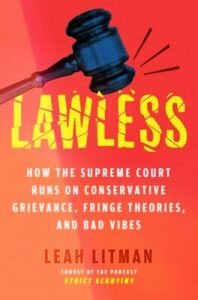
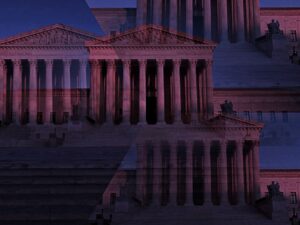
Lawless: How the Supreme Court Runs on Conservative Grievance, Fringe Theories, and Bad Vibes
Today, Republicans are the ruling party in the United States. They control the presidency, the Senate, and the House of Representatives. But they also control the Supreme Court, which is the one institution that is supposed to oversee the legality and constitutionality of what the other two branches do. The Supreme Court has a super majority of six conservative justices, all of whom were appointed by Republican presidents, and three of whom were appointed by Donald Trump himself.
We are joined today by Prof Leah Litman, the author of a compelling and timely new book, Lawless: How the Supreme Court Runs on Conservative Grievance, Fringe Theories, and Bad Vibes. Prof Litman’s premise is that the “the Supreme Court is repeatedly elevating the feelings, sentiments, and political views of the Republican Party” and that the conservative justices consistently reach pre-ordained results that strictly conform to the Republican platform and then they justify those outcomes using high-minded judicial language to give the patina of objectivity. She points out that “Republican-appointed justices seem to think that the real victims of discrimination today are the Republicans, who no longer enjoy the kind of outsize influence, political power, and social standing they once did.”
Guest – Leah Litman is a professor of law at the University of Michigan and a former law clerk to Justice Anthony Kennedy. She is a co-host of the popular podcast Strict Scrutiny and she received the Ruth Bader Ginsberg award for “scholarly excellence” from the American Constitution Society.
—–


US Supreme Court Revokes Legal Protection of Venezuelan Nationals
In an emergency order issued on May 19, the U.S. Supreme Court allowed the Trump administration to revoke legal protections that the Biden administration had granted to hundreds of thousands of Venezuelan nationals.
Only one justice publicly dissented: Ketanji Brown Jackson. Just days earlier, at a legal conference, Jackson delivered the Court’s strongest public rebuke yet of Trump-era attacks on judges who have blocked Trump’s policies on immigration, halting federal grants and contracts, and firing government workers. Her 18-minute speech earned a standing ovation.
In January, the Trump administration announced plans to end Temporary Protected Status (TPS) for Venezuelan nationals—a designation that shields individuals from deportation due to civil unrest and unsafe conditions in their home country. The U.S. has seen a sharp rise in its Venezuelan population, driven by mass displacement stemming from Venezuela’s ongoing political, economic, and humanitarian crises.
Earlier, on March 31, U.S. District Judge Edward Chen issued a nationwide injunction blocking the termination of TPS, preserving protections for an estimated 350,000 Venezuelans and allowing them to continue working legally until at least October 2026, or until the legal challenge was resolved. Judge Chen raised concerns that the administration’s move may have been discriminatory and lacked a sound legal basis. The National TPS Alliance.
Guest – UCLA law professor Ahilan Arulanantham is a leading civil rights attorney and former MacArthur Foundation Fellow. Before joining UCLA, he spent nearly two decades at the ACLU of Southern California, the last two as Senior Counsel. He previously served as a federal public defender in Texas, and clerked on the Ninth Circuit Court of Appeals. Widely recognized for his work defending immigrant rights, he has twice been named California Lawyer of the Year and is a multiple-time honoree on the Daily Journal’s Top 100 Lawyers list.

————————————
Civil Liberties, Civil Rights, Gaza, genocide, Human Rights, Illegal Immigration, Supreme Court, Targeting Muslims, Violations of U.S. and International Law, War Resister
Podcast: Play in new window | Download


Chris Hedges: Trump 2.0
Trump 2.0 is qualitatively different from his first term in office. This time Trump and his allies have brought down a tsunami on us, creating fear and chaos. Tens of thousands of government workers have been fired. Thousands have been deported, some to a torture prison in El Salvador. Due process was ignored. The court orders challenging this have been ignored, as well.
With his extreme tariff measures, Trump has damaged our economy, and it looks like there may be a recession down the road. Trump has promised to use the Army and National Guard to suppress protests. Should there be an act of violence committed by a lone wolf, Trump could use it as an excuse to invoke the Insurrection Act and call out the troops. This is all too reminiscent of what happened in Germany when a lone wolf set fire to the German parliament building. Hitler used this as a pretext for suspending civil rights and civil liberties and outlawing the communist and socialist parties, which were huge at the time.
Moreover, and most importantly, not only politics, but the culture of our country is being changed, as well. The Department of Education has been disbanded. Books are banned. Certain words are forbidden. Universities have come under Trump’s control, starting with Columbia University in New York City The great Kennedy Center, a mecca for U.S. culture, has been taken over by Trump and his Philistine allies.
Chris Hedges, the journalist and author spent two decades as a foreign correspondent serving as the Middle East Bureau Chief and Balkan Bureau Chief for The New York Times where he was awarded the Pulitzer Prize. He is the author of 14 books including War is a Force That Gives us Meaning, Days of Destruction, Days of Revolt, which he co-wrote with the cartoonist Joe Sacco, and The Death of the Liberal Class. Chris’ forthcoming book is titled A Genocide Foretold.
—-


The Great Moral Crime Of Our Time
Israeli -American killing of the Palestinian people living in Gaza is the great moral crime of our time. Gaza is a strip of land 25 miles long and 5 miles wide situated on the shore of the Mediterranean Sea immediately South of Israel. It used to have a population of 2.3 million people and was one of the most densely populated areas on the planet.
The Palestinian people have been murdered by American made bombs dropped on them from American planes and American drones for the last year and a half. A short cease-fire, was recently unilaterally broken by Israel, which resumed the killing in preparation for the removal of the entire population to the Sudan or the Sinai desert in Egypt.
Guest – Philip Weiss is the founder of Mondoweiss, a news and opinion website known for its critical perspective on Zionism and Israeli government policies as well as his support for Palestinian rights. Weiss, a former mainstream journalist, launched Mondoweiss in the mid 2000s as a personal blog before it evolved into a larger platform. His background includes work with publications such as the New York Observer and Esquire magazine. Overtime, Mondoweiss has built a team of contributors and has become a significant voice in progressive circles when it comes to Middle Eastern policies.

—————————-
Civil Liberties, Civil Rights, Freedom Of Speech, Human Rights, Supreme Court
Podcast: Play in new window | Download


James Goodale: Fighting for the Press and Freedom of Speech
Donald Trump has wasted no time in his second term attacking free speech and freedom of the press. He arrested Mahmoud Khalil, a permanent US resident with a green card and a student visa, and is trying to deport him (until restrained by a federal judge) because Khalil led pro-Palestinian protests at Columbia University. He has threatened to deport other students for their pro-Palestinian protests. Trump banned the Associated Press from White House press briefings and Air Force One for using the term “Gulf of Mexico” instead of “Gulf of America.”
He also banned Reuters News Service and Huffington Post from the press pool. He has issued Executive Orders which federal agencies have cited as authority to ban forbidden words from government websites such as the words Diversity, Equity, and Inclusion. He’s threaten to pull federal funding from over 50 universities for teaching aspects of American history such as slavery and racism, which he labels “divisive.” He has encouraged congressional investigations against Democrats who served on the January 6 Committee.
He has promoted a definition of “antisemitism” which would punish political criticism of Israel. And he has filed lawsuits seeking hundreds of million of dollars in damages against ABC, CBS, Media Matters for America, and newspapers based on how they have reported on him, his candidacy, and his actions as President.
Guest – James Goodale is the former vice president and general counsel for The New York Times and, later, the Times’ vice chairman. He is the author of Fighting for the Press: The Inside Story of the Pentagon Papers and Other Battles. Goodale represented The New York Times in four of its United States Supreme Court cases, including Branzburg v. Hayes, in which the Times intervened on behalf of its reporter Earl Caldwell. The other cases were New York Times v. Sullivan, New York Times Co. v. United States (the Pentagon Papers case), and New York Times Co. v. Tasini. He has been called “the father of the reporter’s privilege” in the Hastings Law Journal because of his interpretation of the Branzburg case.
—-
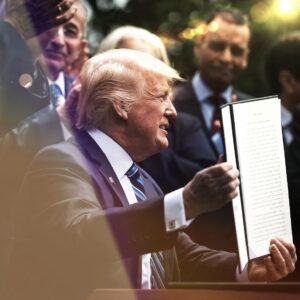
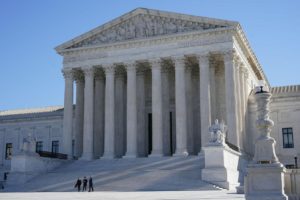
Pushing The Limit Of Presidential Power
Since being sworn in for his second term on January 20, 2025, Donald Trump has signed (with a big black marker) almost 90 Executive Orders or EOs, stretching the limits of Presidential power. In response, over 100 lawsuits have been filed challenging the most egregious and questionable EOs. Some of the most sweeping orders seek to totally dismantle over 70 years of laws, policies, and programs promoting Diversity, Equity, Inclusion, and Accessibility. These EOs were immediately challenged in court. Meanwhile, some companies have surrendered to Trump and terminated their Diversity programs, while civil rights groups are fighting back.
Stephen’s recent article – First They Came For Mahmoud Khalil
Guest – Stephen Rohde is a writer, lecturer and political activist. For almost 50 years, he practiced civil rights, civil liberties, and intellectual property law and has won significant First Amendment victories in state and federal appellate courts. He is a past chair of the ACLU Foundation of Southern California and past National Chair of Bend the Arc, a Jewish Partnership for Justice. He is a founder and current chair of Interfaith Communities United for Justice and Peace; member of the Board of Directors of Death Penalty Focus, and a member of the Black Jewish Justice Alliance. He is the Special Advisor on Free Speech and the First Amendment for the Muslim Public Affairs Council.
Mr. Rohde is the author of the books American Words of Freedom: The Words That Define Our Nation and Freedom of Assembly and numerous articles and book reviews on civil liberties and constitutional history for the Los Angeles Review of Books, American Prospect, LA Times, Ms. Magazine, Los Angeles Lawyer, LA Progressive, Truthdig and other publications.

———————————-
Civil Rights, Human Rights, Supreme Court, Truth to Power
Podcast: Play in new window | Download
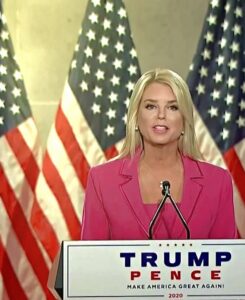
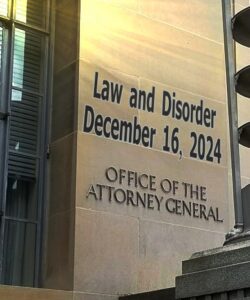
U.S. Attorney General Choice: Florida Attorney General Pam Bondi
Bondi, Florida’s first woman attorney general for eight years from 2011-2019, was part of Trump’s defense team during his first impeachment trial and supported his false claims of fraud following the 2020 election. She’s remained in Trump’s orbit since then, continuing to advise him on legal matters.
In announcing Bondi as his new choice, Trump signaled the role he expects her to play. “For too long, the partisan Department of Justice has been weaponized against me and other Republicans – Not anymore. … Pam will refocus the DOJ to its intended purpose of fighting Crime, and Making America Safe Again.”
By fighting crime, he means going after his political enemies. Bondi has loyally promised that “When Republicans take back the White House” and the Department of Justice, “the prosecutors will be prosecuted — the bad ones — the investigators will be investigated.”
Bondi is a partner at Ballard Partners, the lobbying firm that had been run by Trump’s incoming chief of staff Susie Wiles and whose founder, Brian Ballard, is a top Trump fundraiser. She is co-chair of the law and justice division at the pro-Trump America First Policy Institute. Thrust onto the national stage, Pam Bondi is not a household name. To learn more about her, we went to an award-winning journalist in her home state of Florida.
Guest – Scott Maxwell is a three-time-a-week columnist for the Orlando Sentinel. He joined the Sentinel newsroom as a reporter in 1998, and started writing his column in 2002. He has received awards from the Society of Professional Journalists, the Society of Newspaper Editors and others. Before coming to Orlando, Scott wrote for the Winston-Salem Journal and the Chapel Hill Herald, after graduating from the University of North Carolina at Chapel Hill’s School of Journalism.
—-
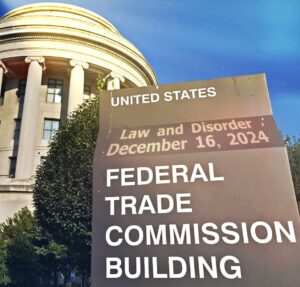
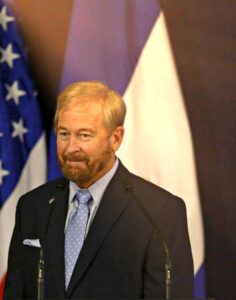
Next FTC Chairman: Business Friendly Approach Or Big Tech Anti-Trust Enforcement
President-elect Donald Trump last week named Andrew Ferguson as the next chair of the Federal Trade Commission. Ferguson is already one of the FTC’s five commissioners, currently consisting of 3 Democrats and 2 Republicans. Ferguson replaces FTC Chair Lina Khan, a vocal critic of Big Tech.
Antitrust laws are designed to promote fair competition by prohibiting monopolistic practices, unfair restraints on trade, and other behaviors that harm consumers or stifle innovation. The FTC plays a key role in enforcing these laws. It investigates businesses for anticompetitive practices, reviews mergers and acquisitions for potential harm to market competition and takes legal action to prevent or rectify violations.
With Trump’s recent nomination of Gail Slater as the Justice Department’s assistant attorney general for antitrust, some predicted that the incoming administration may continue Lina Khan’s tough stance on companies like Google and Apple. But many leading Republicans prefer a more business-friendly approach to antitrust enforcement that would avoid hampering Big Tech’s dealmaking and acquisitions.
Other top contenders for the FTC chairmanship were Melissa Holyoak, a Republican commissioner and former Utah solicitor general and Mark Meador, a former DOJ and FTC official who has served as an antitrust policy adviser to Sen. Mike Lee (R-Utah).
Guest – Laurel Kilgour from the American Economic Liberties Project in DC. Lauren leads the Project’s team of policy analysts and experts to produce research and policy briefs, with a focus on antitrust issues impacting economic liberties.

————————————–
Civil Liberties, Civil Rights, Human Rights, Prison Industry, Supreme Court, worker's rights
Podcast: Play in new window | Download


USPS: Concerns With Louis Dejoy And Election Integrity
Free elections can too easily turn into hollow formalities when coercion, manipulation, or biased governance replace voter choice and participation. The United States Postal Service has historically been one of the most trusted government institutions in the United States, with a strong reputation for reliability and nonpartisanship. Until now.
Louis DeJoy, a prominent Trump donor and former logistics executive, was appointed as Postmaster General in May 2020, just months before the 2020 presidential election. His tenure has been marked by a series of controversial reforms, including slowing mail delivery, removing mail sorting machines, reducing post office operating hours, and limiting overtime for postal workers. These changes have triggered widespread alarm, given the heightened dependence on mail-in voting during the COVID-19 pandemic.
Despite public outcry and congressional investigations, DeJoy continues to oversee an agency crucial to the functioning of our democracy. With the 2024 election on the horizon and the ongoing reliance on mail-in ballots—particularly in swing states—the stakes are high. Voters in rural areas, the elderly, and people with disabilities, often rely on it to cast their ballots. Any disruptions could disproportionately impact these communities and undermine public confidence in the electoral process.
We examine the potential impacts of delayed ballots, changes in USPS service standards, and the wider implications for voter turnout and trust in the system.
Guest – Chuck Zlatkin, legislative director of the New York Metro Area Postal Union.
—-
Sending a big thank you to station KKFI for their generous donation bringing us closer to our fundraiser goal. Please consider helping us reach our fundraiser goal. We’re getting close.
—-
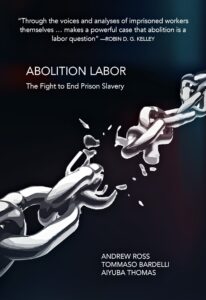
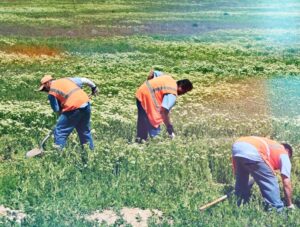
Abolition Labor: The Fight To End Prison Slavery
Operating in the secrecy of the nation’s more than 1,800 prisons, a kind of shadow slave culture is being fostered. Few Americans are aware of the exploitative and pervasive practice of forced prison labor. The 13th amendment to the US Constitution abolished slavery, but it made one exception: prison labor.
Prisoners are forced to work with minimal or non-existent wages, and often with no labor protections. Understanding the scope and implications of forced prison labor is crucial for anyone concerned with social justice and equity. It calls for a re-examination of our treatment of incarcerated persons and for alternatives that promote fairness for everyone, regardless of their legal status. By shining a light on this issue, we can advocate for reforms that prioritize rehabilitation over punishment and strive towards a more just and humane criminal justice system. A new book, Abolition Labor: The Fight To End Prison Slavery, provides an eye-opening overview of the extent of this problem.
Guest – Andrew Ross is a renowned social activist, author, and Professor of Social and Cultural Analysis at New York University, where he also directs the Prison Research Lab. Andrew has contributed to prominent publications like The Guardian, The New York Times, and The Nation. He has authored or edited over twenty-five books, with the recent work, Abolition Labor, co-authored with Aiyuba Thomas and Tommaso Bardelli.
Guest – Aiyuba Thomas recently earned his M.A. from NYU’s Gallatin School of Individualized Study and is an affiliate of the NYU Prison Research Lab. He currently serves as project manager for the Movements Against Mass Incarceration’s archival oral history project at Columbia University. There, he documents the experiences and challenges faced by those affected by the criminal justice system. His firsthand perspective and his extensive knowledge on the subject makes him a powerful voice in the conversation of abolishing forced prison labor.

——————–
Civil Liberties, Civil Rights, Climate Change, Human Rights, NSA Spying, Supreme Court, Surveillance
Podcast: Play in new window | Download


The Center for Climate Integrity
Today, we’re delving into a legacy of deception and destruction. For more than 50 years, Big Oil companies like ExxonMobil, Chevron, and BP have known that burning fossil fuels would raise global temperatures. Yet, instead of taking responsibility or warning the public, they have orchestrated campaigns of denial, disinformation, and delay.
As a result, we are living with unprecedented climate disasters. Following the hottest year on record in 2023, extreme weather events have intensified, from record-breaking wildfires scorching California and Canada, to catastrophic hurricanes pounding the Gulf Coast. During this past June, nearly 5 billion people globally faced intense heat over nine days, with more than 60% of the world’s population encountering temperatures made at least three times more likely by climate change. These events not only devastate ecosystems and communities, but they also cost taxpayers billions of dollars in damage and recovery.
Guest – Corey Riday-White, Managing Attorney at the Center for Climate Integrity, an organization that is fighting to hold Big Oil accountable for its deceit. The Center is supporting litigation efforts in several states, aiming to force fossil fuel companies to pay for the damage they’ve caused. Let’s hear more about their approach, and how the legal system might be used to confront this ongoing climate crisis.
—-


Surveillance Dragnet: Geofence Warrants
Recently, the Fifth Circuit Court of Appeals handed down a landmark decision in U.S. v. Jamarr Smith, holding that geofence warrants are “categorically prohibited by the Fourth Amendment.” What is a Geofence Warrant? They compel companies such as Google to hand over data on every device in a particular geographical area over a set period of time. Not surprisingly they are a controversial tool in law enforcement’s investigative arsenal.
Privacy experts argue they amount to a dragnet search that violates the privacy of countless innocent individuals. Proponents, on the other hand, see them as necessary for solving crimes in our digital world. The Fifth Circuit ruling is a major development in the ongoing debate over privacy and mass surveillance.
Guest – Alan Butler, the executive director of the Electronic Privacy Information Center or EPIC, in Washington, DC. EPIC has been at the forefront of legal battles to improve data protection standards to protect individual rights in the rapidly advancing surveillance state. Alan Butler is Chair of the Privacy and Information Protection Committee of the American Bar Association Section on civil Rights and Social Justice. He has authored briefs on behalf of EPIC in significant privacy cases, including an amicus brief in Riley v. California that was cited in the Supreme Court’s unanimous landmark ruling that the warrantless search and content seizure of cell phones during an arrest is unconstitutional.
Music out: The Down Hill Strugglers – Abandoned Orchards That Grow

———————-
























